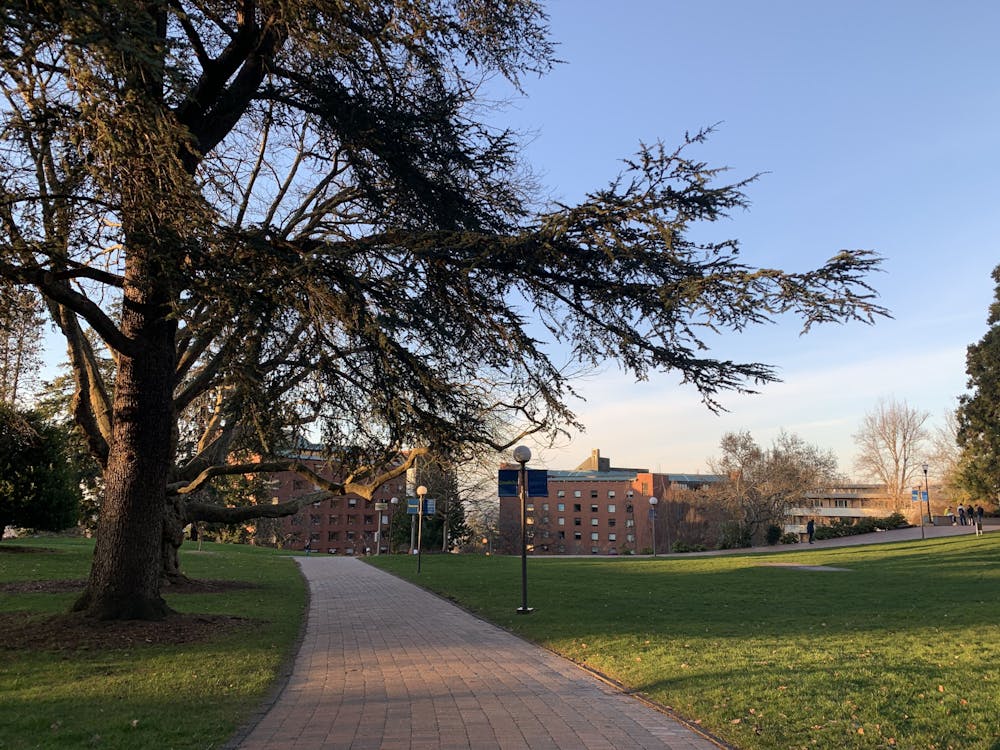As part of President Sabah Randhawa’s Accessibility, Diversity, Equity and Inclusion timeline, Western Washington University is in the process of joining the Okanagan Charter, an international charter that aims to promote lifelong community health and wellbeing on college and university campuses through a wholistic, university-wide and collaborative set of goals and initiatives.
Sislena Ledbetter, executive director of counseling, health and wellness at Western, is heading the process of joining the charter and meets with the prospective universities’ cohort monthly to discuss ways to implement the framework.
According to the charter, the five pillars that it aims to address are improving equity, mental and physical wellbeing, social justice, respect for diversity, sustainability and food security. Rather than each element being fragmented, the charter aims to holistically analyze where the community is currently at and then set goals to work toward a more healthy university with guidance from the framework.
In the May 10 Faculty Senate meeting, Ledbetter presented the charter, connecting its pillars to real issues that higher education faces.
“[Students] leave because of issues with anxiety, depression and stress, they don't feel included, there's no sense of belonging or sustainability and food security, so they leave,” she said. “We've got to be able to deal with these effectively so that when [students] do show up, they are prepared to get the knowledge that we impart.”
According to the University of British Columbia’s Okanagan Charter website, the charter originates from a 2015 conference co-hosted by the university. Education and health organization leadership from 45 countries, as well as members of the United Nations Educational Scientific and Cultural Organization and the World Health Organization, gathered to discuss the implications of promoting wellbeing as a standard in educational spaces.
The conference resulted in the development of the charter, which acts as a framework for member organizations to implement and achieve wellbeing for their community stakeholders. This is guided by two central calls to action which, according to the charter are “to embed health into all aspects of campus culture, across the administration, operations and academic mandates,” and “to lead health promotion action and collaboration locally and globally.”
Western, along with seven other American universities including the University of Washington and several University of California campuses are on track to sign on to the charter, which would add them to a growing network of institutions that are working toward wellbeing.
Adopting the charter at Western is still in planning, with several options of how to move forward.
“Universities can either formally adopt [the charter], or what many universities do is to hold off a formal adoption but first develop a plan to engage [the] community, and still leverage the charter to drive action, and then later get to a formal agreement,” Matt Dolf, co-chair of the International Health Promoting Colleges Network said. “Others will start with a formal agreement on day one and use that as a launching pad to engage the community and then develop a formal strategy.”
As part of Western’s plan to become a more accessible, diverse, equitable and inclusive environment, adopting the charter is one way that Western can achieve these goals, Ledbetter said.
Ledbetter plans to lead the charter by moving away from traditional approaches that leave communities out of planning, making community issues and ideas key elements of Western’s framework, she said.
“We're talking about implementing this in tandem with [diversity, equity and inclusion] because they are inseparable,” Ledbetter said. “If you develop strategies that deal with wellness and health promotion, then you are right in the wheelhouse of [diversity, equity and inclusion],” Ledbetter said.
Ezra Beimborn, a fourth-year Western student, said that even though Western already has resources for students to better their mental and physical health, he isn’t sure if they are as effective as they could be.
“[Western] puts an emphasis on mental health and things like food security, mostly with advertising their different services on posters around campus, especially mental health services,” Beimborn said. “I don’t necessarily know if it's effective … I don’t think I have any friends or know anyone that has used Western’s services.”
Beimborn said that services could be more effective by increasing the amount of focus and exposure that different programs receive, making more people aware and connected to health and wellness on campus.
Dolf echoed the importance of getting the community involved, as the charter can only be as effective as those who choose to nurture it.
“It’s important to get leadership buy-in, but also community buy-in at the same time,” Dolf said.
Ledbetter plans to present the charter to Randhawa for signing on or before Sept. 1, which will mark a shift in practices for the university as it commits to putting wellbeing first, Ledbetter said.
“[After the signing] we can join the first cohort of schools ready to move forward with this new way of being. The signing is symbolic, but it's a meaningful symbol — it's a signal that we are shifting perspectives,” Ledbetter said.
“I don't want to be misleading; this is not a project, it's a new way of being,” Ledbetter said. ”Once we start, it should never end. The work will be iterative, just like strategic planning.”
Students can join the Counseling Health and Wellness Advisory Committee to provide input as the charter moves forward by applying online, or emailing Liz Linke. All Okanagan Charter inquiries should have Okanagan Charter in the subject line.




